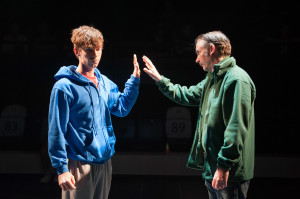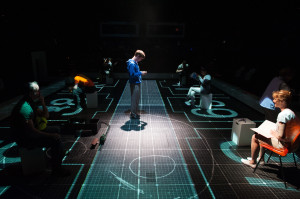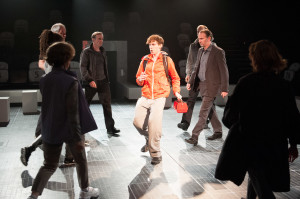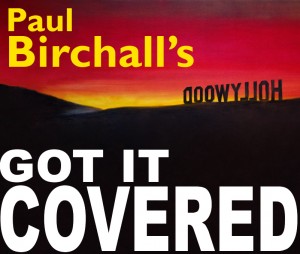Digital Dionysus
The Curious Incident of the Dog in the Night-Time
By Terry Morgan

As someone who loves theater but doesn’t have the wherewithal to travel across the country or the globe to see particular productions, I’ve wished for a long time that theater companies would preserve their shows in some way. The longstanding argument against this was that it would reduce the live show’s audience or profit margin, but this always seemed short-sighted to me. If you’re doing a show of possible national or international interest, there is a lot of potential audience that will never be able to attend, simply due to time or distance. The other argument would be that seeing something on DVD or in a cinema can’t compare to seeing it live in a theater. I don’t disagree with that, but isn’t it better to have the option to see something at least in some format than never to see it at all? Thankfully, London’s National Theatre started broadcasting recordings of their productions in movie theaters back in 2009, and this experiment has been a resounding success, artistically and commercially.
The first time NT Live broadcasts one of its plays, it’s a live performance sent via satellite to whatever theaters have agreed to present it, but shown on a delay due to the difference in time zones. Then there are some encore performances of that recording over months or more than a year, such as shows like Danny Boyle’s popular version of Frankenstein. This is convenient for audience members, who have multiple opportunities to catch a show they may have missed. As of this writing, Los Angeles has three venues that regularly carry NT Live productions: the Downtown Independent, the Sundance Sunset Cinemas and the James Bridges Theater at UCLA. I’ve attended several of the NT Live screenings, and they’ve always been well-attended, such as the encore presentation of The Curious Incident of The Dog in The Night-Time, which I caught at the Downtown Independent recently.

The Curious Incident of the Dog in The Night-Time is based on the best-selling novel by Mark Haddon, and was adapted for the stage by Simon Stephens. The production was revived in London in June, and is slated to appear on Broadway, at the Barrymore, this coming September.
Christopher (Luke Treadaway) is a 13-year-old who is skilled with math but whose autism causes him difficulties in dealing with others. He’s been raised by his rough but well-meaning father Ed (Paul Ritter), after Christopher’s mother Judy (Nicola Walker) died of a heart attack years before. Christopher discovers a murdered dog on a neighbor’s lawn, and he decides to investigate the crime on his own. What he discovers during this investigation uncovers not only the perpetrator of the crime but also uncomfortable facts about his own life.
Treadaway is believable and sympathetic in the lead role, onstage for the entirety of the show, although the character of Christopher as written feels a bit too earnest. Ritter is fine as Ed, a father whose weariness and stress over raising Christopher solo makes his temper unsteady. Walker is terrific as Judy, particularly in a scene where her initially pleasant memories of raising Christopher gradually and inexorably become an attack against his existence. Una Stubbs is charming as the kind neighbor Mrs. Alexander, whose concern for Christopher leads to unexpected trouble.

Director Marianne Elliott does a remarkable job of visualizing Haddon’s novel, and her staging is truly the star of the show. The set is a rectangular grid with light-emitting diodes in the floor that combine with Paule Constable’s lighting and Finn Ross’s video projections to create vivid locations — from a moving subway train to the stunning use of the entire stage as a moving escalator. Elliott manages the actors to superb effect, constantly moving them on and offstage as neighbors, crowds or even pieces of scenery, although the movement sometimes seems overly balletic. The overhead view often offered by this recording is actually an improvement of sitting in the theater, because it fully displays the production in a way that an audience at the theater couldn’t see.
My only two quibbles about the show both derive from the marketing of the source material. The book and the play are both marketed as if it’s a quirky feel-good story, when in fact it’s a serious drama. People may well be surprised by how much the protagonist is made to suffer. Secondly, that nobody other than Christopher seems overly concerned about a dog that’s been impaled by a pitchfork on a suburban lawn is simply surreal, particularly in animal-loving Britain.
The Downtown Independent, where I saw this screening, is a friendly venue that serves both beer and wine and has a convenient parking lot next door and street parking available. This is a dazzling and innovative show, and is well worth the time of any theatergoer.
The Curious Incident screens at the James Bridges Theater at UCLA on June 22. For more information, check out ntlive@nationaltheatre.org.uk and downtownindependent.com.




